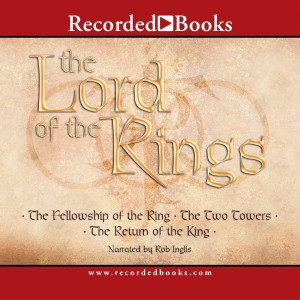 Rachel Manija Brown wrote this review.
Rachel Manija Brown wrote this review.
Yes, The Lord of the Rings audio version is expensive. It has to be: it’s on forty-five snugly packaged CDs. But if you’re a Tolkien fan who drives a lot, this may be one of the best investments you ever make.
There are no sound effects except for snatches of a folk tune at the beginning and ending of each set of CDs. I could have dispensed with the tunes; there are two of them, one perky and one melancholy, and which one ends which disc seems random. Most egregiously, “perky” begins playing after “‘Well, I’m back,’ he said.”
There is nothing else but Rob Inglis, and Tolkien’s words. Inglis has performed with the Royal Shakespeare Company, and his old-school English voice is a perfect match for the books. There is a small photo of him on the back of the CD label. He looks rather hobbit-like, much like my conception of Bilbo on his eleventy-first birthday, and his hair sweeps back over his ears, making them look distinctly pointy. He shines with comedy, and his rendition of Bilbo’s party had a non-Tolkien fan who shared my car howling. But he’s also good at conveying solemnity, and his reading of the madness of Denethor was genuinely frightening.
He does different voices for all the characters, and, though he’s not a distinguished singer, sings the songs in a way that conveys their emotional qualities.
His voice of Gollum is the most distinctive, and clearly the one he had the most fun with: cackling, gurgling, whining, and hissing, simultaneously hilarious and pathetic. I always found the second half of The Two Towers a slog; yes, there’s “Of Herbs and Stewed Rabbit,” and the Dead Marshes, and finally Shelob, but otherwise it’s an inordinate amount of walking, climbing, walking, climbing, looking for water, walking… Inglis’s Gollum makes that section not just tolerable, but often a treat… although it would take a greater man than he to save the part where Sam and Frodo take ten pages to climb a hill.
Even if you’ve read the books many times yourself, hearing them aloud is different. You are forced to listen to passages you might have otherwise skipped or hurried over, and many of them yield up unexpected treasures, a turn of phrase or simile that you never noticed before. We can never again read them for the first time, but this is the next best thing.
(Recorded Books, 2002)
